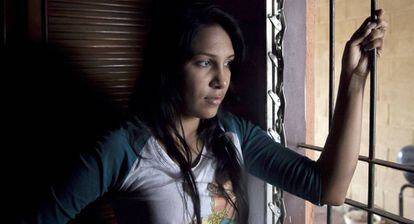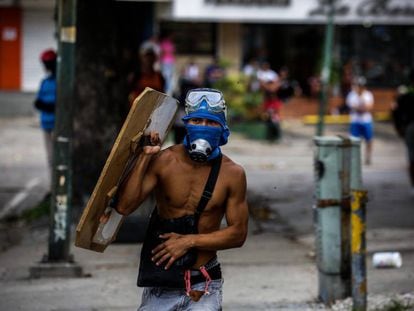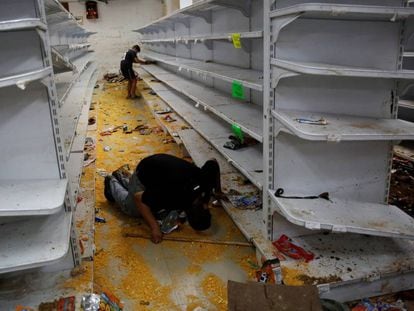Torture victims in Venezuela testify to Maduro regime’s brutality
UN condemns “widespread and systematic” use of “excessive force” against political opponents
“Crawl like a worm,” shouted soldiers at Paula Colmenarez Boscán, a law student at Venezuela’s Central University after they seized her in the eastern suburbs of Caracas during a demonstration in July against President Nicolás Maduro. “Around a dozen soldiers arrested me. They groped me between my legs while they took me away on a motorbike. They covered my head, they beat me and they stole my cellphone. They only freed me when a photograph of my arrest went viral,” she explains.
Her case has raised international concern about the mounting repression in Venezuela. On Tuesday, the UN’s High Commissioner for Human Rights highlighted the “widespread and systematic” use of “excessive force” by the regime in Caracas against protestors. The report condemned arbitrary arrests, cruel treatment and torture of dissidents during opposition protests, which are now in their fifth consecutive month. Tarek William Saab – Venezuela’s Ombudsman and attorney general appointed by the National Constituent Assembly, the new legislative body created by the government – refused to discuss the report with EL PAÍS.
They threw tear gas canisters at us. It was like a Nazi gas chamber Gaetano Costa, academic
Tamara Tarciuk of Human Rights Watch says that most of those who have been tortured are dissidents or critics of the government: “They are not the well-known opposition leaders, but instead ordinary people who the government considers dissidents simply because they take part in demonstrations or because they are passing by near one.”
In June, Mileidy González, a nursing assistant, was arrested by police when she was walking near a demonstration in the western city of Barquismeto. “I was tied up by the wrists and hung up and then I was beaten repeatedly. They threatened to rape me and plant drugs on me if I reported them. They destroyed me,” she says.
She has photographs of her scars, and her spleen was damaged. She spent eight days in hospital after her beating, but was never given a medical report on her condition after she was arrested.
“No doctor dared to. They didn’t even scan me,” she explains, adding that she must now report each month to a court after she was charged with damaging property and resisting arrest.
I was hung up by the wrists and beaten repeatedly. They threatened to rape me Mileidy González, nursing assistant
Gaetano Costa, a 42-year-old academic and member of opposition party Popular Will, was first arrested by the paramilitary Bolivian National Guard (GNB) in 2014 at a demonstration. “I was not alone. Several others were arrested with me. We were taken to a GNB building and beaten and threatened with being disappeared. They threw tear gas canisters at us. It was like a Nazi gas chamber. The soldiers said we belonged to the opposition,” he says. He has continued protesting this year and was again arrested and beaten.
González says he believes his testimony could be useful to raise awareness internationally about human rights abuses in Venezuela. Andrés Colmenarez, the head of NGO Funpaz, corroborates the stories of mistreatment of opponents of the regime. He says the majority of people arrested and tortured do not dare to speak out. “During the protests of 2014, some 80 people reported being tortured in the state of Lara; this year the figure is 20. That isn’t because there have been fewer cases, but because people do not dare to make these abuses public,” he says.
Tamara Bechar, a lawyer with the Human Rights Center of the Andrés Bello Catholic University, says that police and security forces act with impunity, which deters people from reporting abuses.

“I have defended minors, aged 16 and 17, arrested during protests. They have told the courts about abuses and mistreatment, some of it of a sexual nature, by the state security forces. This is all logged officially, but nothing happens to the people responsible, who are all soldiers,” she explains. Taraciuk says it is essential that such cases are all documented. “Today it is impossible to imagine justice in Venezuela because all judicial power is simply an adjunct of the government.”
“Spider-Man,” the alias used by a member of the so-called Resistance Movement, has not reported the soldiers who he says blinded him in his left eye during a protest against the vote for the Constituent Assembly on July 30.
“They had beaten me earlier at a police station, but I continued protesting because I wasn’t afraid,” he says. The 22-year has since gone underground, saying he dare not report the soldiers who beat him: “They would arrest me and they would remain free.”
English version by Nick Lyne.













































